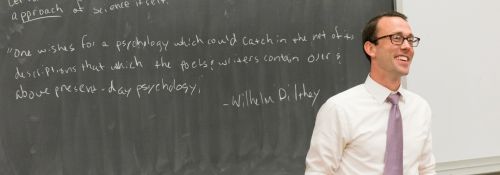
Psychology and the Liberal Arts
Spotlight on Dr. Collin Barnes
Written by Sarah Chavey
Dr. Collin Barnes’s interview at Hillsdale was by far his most difficult for an academic position, though he’d completed a few. The questions were unusually stimulating, not simply testing his knowledge of psychology but his ability to place his knowledge into a much larger context.
“The questions I was confronted with obligated me to stretch beyond my formal training as a psychologist. Questions like, ‘What’s the purpose of psychology? How does it enter into the broader intellectual conversation between the disciplines? What does it offer to the understanding of the human person?’”
Four years later, Dr. Barnes is not only better equipped to answer those questions but has become fascinated by the pursuit of understanding them.
“Since arriving at Hillsdale College I have become deeply interested in how psychology as a discipline intersects with the classical liberal arts. This was what drew me to the college, and it is what has occupied my scholarly attentions since arriving,” Dr. Barnes said. The questions have “infected” his classes, their roots reaching into everything and remaining on his mind constantly.
Dr. Barnes believes psychology is best studied in union with other disciplines, specifically the disciplines from which it arose.
“The student of psychology, to be a good psychologist, has to stand on the razor’s edge—to be burdened by human existence and experience and the power of science; and to be pulled fully in either direction is to lose the thing,” Dr. Barnes said.
As an undergraduate, Dr. Barnes was drawn to psychology because it targets the individual person. This initially tempted him toward becoming a therapist or clinical worker, but after becoming acquainted with the academic side of psychology, he realized it was a discipline that could be pursued as an object of “intellectual curiosity” in an “investigative fashion.”
He finished his undergraduate at John Brown University, attended University of Oklahoma graduate school, and worked for two years before beginning his career at Hillsdale, where he says he’s learned much about gratitude from his students.
“At first, I was stunned when they thanked me at the end of classes,” he said. But he realized quickly that rather than paying tuition and expecting a certain grade, Hillsdale students view their education as an opportunity, not an obligation.
“There’s a fervor among students for a real desire to understand, to comprehend, and it can’t be satisfied with just eating a candy bar or something,” Dr. Barnes said. It is the interaction between professors and students that satisfies this craving.
“Professors and students are minds interfacing, interacting with, and influencing each other,” Dr. Barnes said. “And when that is mixed with consideration of the biggest questions you can conceivably ask, then I think everyone has the opportunity to touch upon something eternal.”
 Sarah Chavey is a music major from Ann Arbor, Michigan. She hopes to pursue journalism when she graduates in 2017.
Sarah Chavey is a music major from Ann Arbor, Michigan. She hopes to pursue journalism when she graduates in 2017.